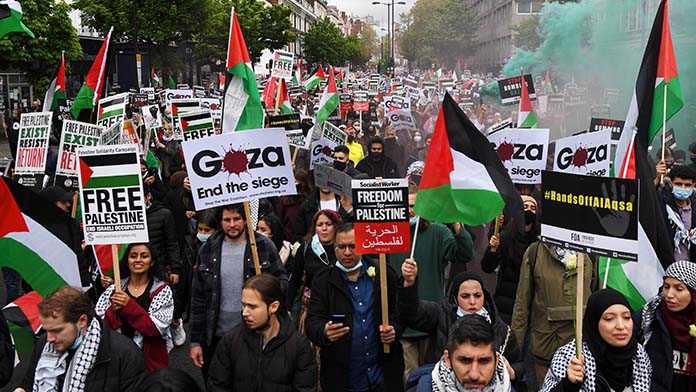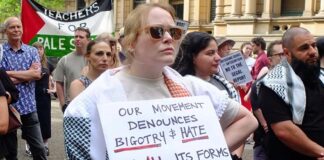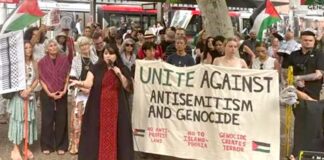Hamas has staged a dramatic series of attacks against Israel, breaching the border wall and briefly taking control of Israeli military posts and towns.
This is an act of resistance against the brutal Israeli occupation. Over 200 Palestinians had already been killed in near daily Israeli shootings and settler violence this year. We stand in solidarity with the Palestinian resistance against Israel.
This war didn’t begin when Hamas sent rockets and soldiers over the border. Israel has been waging war against the whole civilian population of Gaza almost continuously since 2007.
Since then they have suffered four major wars with around 5400 Palestinians killed, according to the UN, compared to less than 100 Israelis, most of them soldiers.
Israel has blockaded the area for over 15 years, trapping 2.3 million Palestinians in an open-air prison. Close to 60 per cent of the population live in poverty and are reliant on food aid, without safe drinking water or reliable electricity. Constant bombing has left homes, hospitals and schools in ruins.
In an act of collective punishment, Israel has now cut off all electricity and is stopping fuel and goods entering Gaza.
The bulk of Gaza’s population are refugees expelled from Israel in 1948 as the Zionist state was established.
Predictably, the Australian government has lined up with the US and other Western leaders, siding wholeheartedly with Israel. Foreign Minister Penny Wong declared the government “unequivocally condemns” Hamas while Prime Minister Anthony Albanese claimed the Hamas operation was “abhorrent” and “a very dark 24 hours”.
They said nothing about the abhorrent conditions in Gaza or Israel’s occupation and terror against the Palestinian people.
Israel humiliated
Just as the most right-wing and aggressive Israeli government was boasting of an historic Middle East settlement centred on a deal with Saudi Arabia, the Hamas attacks have struck their biggest blow against Israel in decades.
Over 700 Israelis are dead and dozens have been taken hostage. Hamas is hoping to trade the hostages for Palestinian prisoners or other concessions.
Its deputy chief Saleh al-Arouri told Al Jazeera that Hamas had enough hostages to free all 5200 Palestinian prisoners in Israeli jails.
But Israel will extract a brutal price for the humiliating assault. Israeli President Benjamin Netanyahu has declared he would “take mighty vengeance” and make Gaza “pay an unprecedented price”.
Israel airstrikes have already hit several residential towers, killing over 300 Palestinians in the first day. In the major war in 2014 Israel killed 2200 Palestinians in seven weeks. That war included a ground invasion of Gaza—and many are expecting Israel to launch such an operation again.
The Palestinians have continued to courageously resist. But Palestinian military resistance alone does not have the power to end the Israeli occupation.
Hamas has issued a call to arms for Palestinian supporters in the region. “We must all fight this battle, especially the resistance fighters in the West Bank,” said the deputy leader of Hamas in the occupied West Bank.
The crucial question will be whether the struggle spreads to the Arab states that surround Israel.
Military edge
Israel is armed to the teeth by US imperialism, with the most advanced bombs, fighter jets and missile defence systems. It has one of the world’s most powerful armies and an overwhelming military edge over other states in the region.
From its foundation it has relied on the support of Western imperialist powers to seize and occupy Palestinian land, playing a key role imposing US control of the surrounding Arab states in return. It still receives over $4 billion in US military aid every year, second only to Ukraine.
Some of the most powerful Palestinian resistance has been the mass protest movements involving demonstrations, civil disobedience and strikes.
The “unity intifada” of 2021 saw Palestinians stage protests and strikes across all of historic Palestine, from Haifa and Lydd to the occupied territories of Jerusalem, Gaza and the West Bank. This helped put the global spotlight on the racism and violence of Israeli settlers, and their ongoing dispossession of the Palestinians in places like Sheikh Jarrah.
Israel’s greatest fear is the way Palestinian resistance has inspired movements from below across the Arab world. There is a deep solidarity for the Palestinian struggle all across the region.
Solidarity demonstrations with Palestine played an important role in fuelling opposition to the regime in Egypt in the lead up to the 2011 revolution. The first Palestinian intifada in 1988 inspired an uprising from below in Algeria the same year.
Israel relies on the corrupt Arab rulers in countries like Egypt, Jordan and Saudi Arabia to help it maintain control over the Palestinians. Egyptian dictator Abdel Fattah El-Sisi helps seal the border with Gaza that enforces Israel’s blockade.
The revolutions of 2011 in countries like Egypt and Tunisia were ultimately defeated. But they showed the power of the Arab working class to topple regimes. Ultimately, freedom for Palestine is going to require a revolution from below across the Arab world.
Right now, Palestinians need the widest possible international solidarity for their struggle as Netanyahu threatens to extend the occupation and reduce parts of Gaza to rubble.






